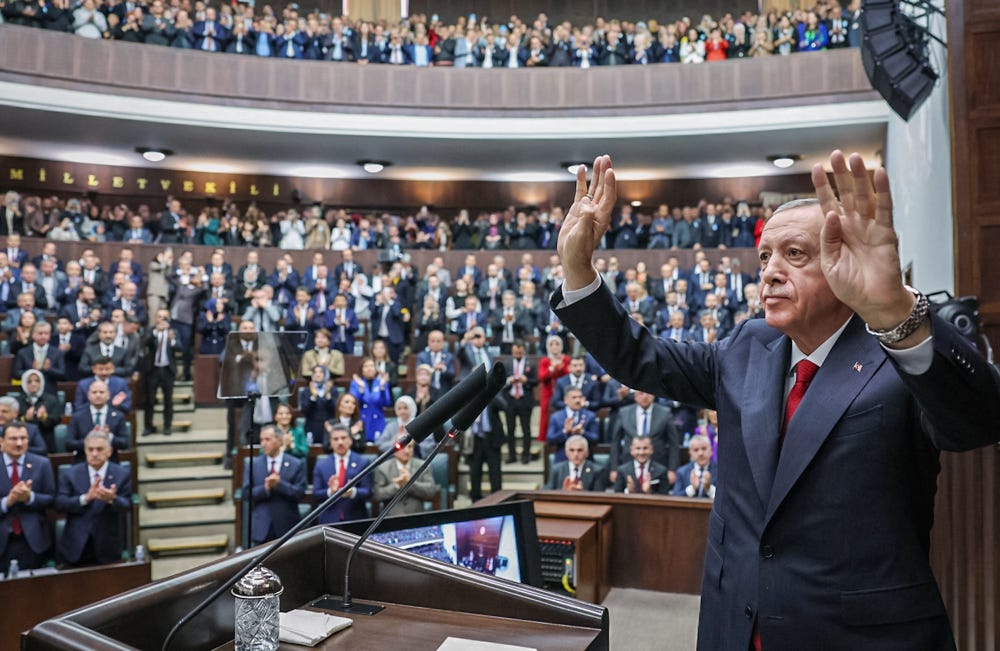There is no lowbrow or highbrow humor. Only the unibrow humor of Recep İvedik paired with classic art.
In this week’s issue:
Top figures comment on top court battle
CHP’s new A-team
Erdoğan calls Israel a ‘terror state’
Turkey’s stalled EU relations
Sweden’s NATO bid on the agenda
Economic outlook on the policy U-turn
Ardahan’s lost elephant
And don’t miss Eray Görgülü’s latest report on İYİ Party chaos and Akşener’s leadership struggles.

Some countries have rule of law. Others have rule of law law, as in dueling interpretations of the law, best exemplified with the ongoing battle between top courts in Turkey.
Since our last recap, pretty much every political figure has commented on the apparent judicial crisis, which involves a major challenge and potential legal action against the Constitutional Court launched by Turkey’s Supreme Court of Appeals, which I’ll refer to by its Turkish name, Yargıtay.
To review the top comments: Pres. Erdoğan weighed in Friday, saying he would not side with either court and would instead play the role of a referee. Though hours earlier, he told reporters:
“The Constitutional Court has made many mistakes in a row at this point, which seriously saddens us,” according to statements published Friday by his office.
Choose your own interpretation. CHP head Özel saw the statements as the makings of a “judicial coup”, stating:
"Until Erdoğan's statement [Friday], this was just a judicial crisis … now, it is clear that this is an attempt to eliminate the constitutional order by Erdoğan."
A rotating group of CHP members has since held a sit-in protest in parliament “to keep the judicial crisis” on the agenda. In response, Erdoğan Wednesday told protesting lawmakers: “If you are looking for a place to sit, go to the park.”
Top Erdoğan ally MHP chair Bahçeli – a long-time constitutional court opponent – banged the deplore drums harder Tuesday, calling again for the "the closure or restructuring” of the court, this time adding its members can “go to Qandil” if they want to mess with Turkey.
Throughout, Justice Min. Yılmaz Tunç has shared many assessments of the situation, noting the current constitution has been amended 184 times and has become a "patchwork" of rules. His two main points tend to be:
"There is uncertainty arising from both the law and the constitution."
“Our goal is to completely change the constitution.”
This brings us to the core issue at stake: Turkey’s constitution and Erdoğan’s stated aim of revising it or at least amending it … further. As outlined by Gökçer Tahincioğlu here, constitutional changes have long been the subject of political power struggles in Turkey.
The same can be said for the current moment, according to Osman Can, a law professor at Marmara University and former rapporteur-judge for Turkey’s Constitutional Court.
“The Constitutional Court is the only institution that can decide on the violation of the constitutional rights,” Can told Turkey recap, adding he rejected the Justice minister’s statements regarding “uncertainty” in the law.
“The constitution has a very clear capacity and competence and [its] decision is binding,” he continued. “When the [Yargıtay] says ‘no, I do not accept this decision’, it is a clear and flagrant violation of the constitution.”
Can went on to define recent events not as a judicial crisis, but as a political crisis due to the comments and pressure from political leaders in Ankara.
“They are violating the law and from this violation, they somehow create a new competence, which gives them the power to change the constitution,” Can said. “It is absurd. It cannot be.”
– Diego Cupolo


